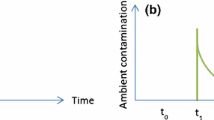Abstract
In this paper we develop the time-dependent pollution control problem in which different countries aim to determine the optimal investment allocation in environmental projects and the tolerable pollutant emissions, so as to maximize their welfare. We provide the equilibrium conditions governing the model and derive the evolutionary variational inequality formulation. The existence of solutions is investigated and a numerical example is also presented.
Similar content being viewed by others
References
Baiocchi C., Capelo A.: Variational and quasivariational inequalities. Applications to free boundary problems. Wiley, New York (1984)
Beckman M.J., Wallace J.P.: Continuous lags and the stability of market equilibrium. Econ. New Ser. 36, 58–68 (1969)
Bernard, A., Reilly, J., Vielle, M., Viguier, L.: Russia’s role in the Kyoto Protocol, MIT Program on the Science and Policy of Global Change, Report 98
Breton M., Zaccour G., Zahaf M.: A differential game of joint implementation of environmental projects. Automatica 41, 1737–1749 (2005)
Breton M., Zaccour G., Zahaf M.: A game-theoretic formulation of joint implementation of environmental projects. Eur. J. Oper. Res. 168, 221–239 (2006)
Breton M., Martín-herrán G., Zaccour G.: Equilibrium investment strategies in foreign environmental projects. J. Optim. Theory Appl. 130, 23–40 (2006)
Brezis H.: Equation et inéquations non linéaires dans les espace vectoriel en dualité. Ann. Inst. Fourier 18, 115–175 (1968)
Daniele P., Maugeri A., Oettli W.: Time-dependent traffic equilibria. J. Optim. Theory Appl. 103, 543–554 (1999)
Daniele P.: Dynamic networks and evolutionary variational inequalities. Edward Elgar Publishing, Cheltenam (2006)
Daniele P., Giuffrè S.: General infinite dimensional duality and applications to evolutionary network equilibrium problems. Optim. Lett. 1(3), 227–243 (2007)
Donato M.B., Milasi M., Vitanza C.: Dynamic Walrasian price equilibrium problem: evolutionary variational approach with sensitivity analysis. Optim. Lett. 2, 113–126 (2008)
Facchinei F., Fisher A., Piccialli V.: On generalized Nash games and variational inequalities. Oper. Res. Lett. 35, 159–164 (2007)
Facchinei F., Kanzow C.: Generalized Nash equilibrium problems. 4OR 5, 173–210 (2007)
Friesz T.L., Bernstein D., Smith T.E., Tobin R.L., Wie B.W.: A variational inequality formulation of the dynamic network user equilibrium problem. Oper. Res. 41, 179–191 (1993)
Giannessi, F., Maugeri, A., Pardalos, P.M. (eds): Equilibrium problems and variational models. Kluwer Academic Publishers, Dordrecht (2001)
Harker P.T.: Generalized Nash games and quasi-variational inequalities. Eur. J. Oper. Res. 54, 81–94 (1991)
Kinderleher D., Stampacchia G.: An introduction to variational inequalities and their applications. Academic Press, New York (1980)
Korpelevich G.M.: The extragradient method for finding saddle points and other problems. Matekon 13, 35–49 (1977)
Maugeri A., Raciti F.: On existence theorems for monotone and nonmonotone variational inequalities. J. Convex Anal. 16(3–4), 899–911 (2009)
Maugeri A., Scrimali L.: Global Lipschitz continuity of solutions to parameterized variational inequalities. Boll. Unione Mat. Ital. (9) 2, 45–69 (2009)
Nagurney A.: Network Economics: A Variational Inequality Approach. Kluwer Academic Publishers, Dordrecht (1993)
Nagurney A., Liu Z., Cojocaru M.G., Daniele P.: Dynamic electric power supply chains and transportation networks: an evolutionary variational inequality formulation. Transp. Res. E 43, 624–646 (2007)
Nagurney A., Parkes D., Daniele P.: The internet, evolutionary variational inequalities, and the time-dependent braess paradox. Comput. Manage. Sci. 4, 243–281 (2007)
Nash J.F.: Equilibrium points in n-person games. Proc. Natl. Acad. Sci. 36, 48–49 (1950)
Nash J.F.: Non-cooperative games. Ann. Math. 54, 286–295 (1951)
Nesterov, Yu., Scrimali, L.: Solving strongly monotone variational and quasi-variational inequalities. CORE Discussion Papers, Available online at http://papers.ssrn.com (2006)
Oden J.T., Demkowicz L.F.: Applied Functional Analysis. CRC Press, Boca Raton (1996)
Pang J.S., Fukushima M.: Quasi-variational inequalities, generalized Nash equilibria, and multi-leader-follower games. Comput. Manag. Sci. 2, 21–56 (2005)
Raciti F., Scrimali L.: Time-dependent variational inequalities and applications to equilibrium problems. J. Global Optim. 28, 387–400 (2004)
Scrimali L.: Quasi-variational inequalities in transportation networks. Math. Models Methods Appl. Sci. 14, 1541–1560 (2004)
Scrimali L.: The financial equilibrium problem with implicit budget constraints. Cent. Eur. J. Oper. Res. 16, 191–203 (2008)
Scrimali L.: A solution differentiability result for evolutionary quasi-variational inequalities. J. Global Optim. 40, 417–425 (2008)
Scrimali L.: Mixed behavior network equilibria and quasi-variational inequalities. J. Ind. Manag. Optim. 5(2), 363–379 (2009)
Stampacchia, G.: Variational inequalities, theory and applications of monotone operators. In: Proceedings of a NATO Advanced Study Institute (Venice, 1968), Oderisi, Gubbio, pp. 101–192 (1969)
UNFCCC Kyoto Protocol to the United Nations framework convention on climate change. United Nations, New York (1997)
Author information
Authors and Affiliations
Corresponding author
Rights and permissions
About this article
Cite this article
Scrimali, L. A variational inequality formulation of the environmental pollution control problem. Optim Lett 4, 259–274 (2010). https://doi.org/10.1007/s11590-009-0165-2
Received:
Accepted:
Published:
Issue Date:
DOI: https://doi.org/10.1007/s11590-009-0165-2




